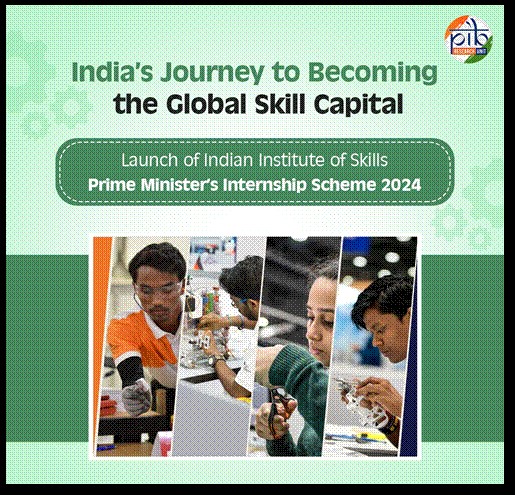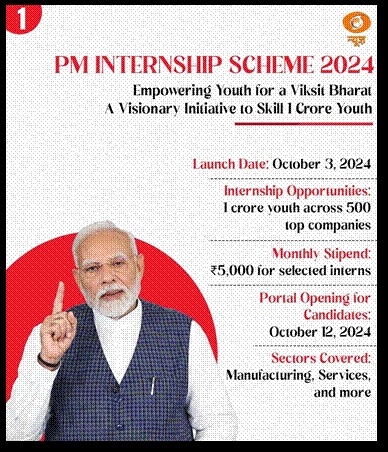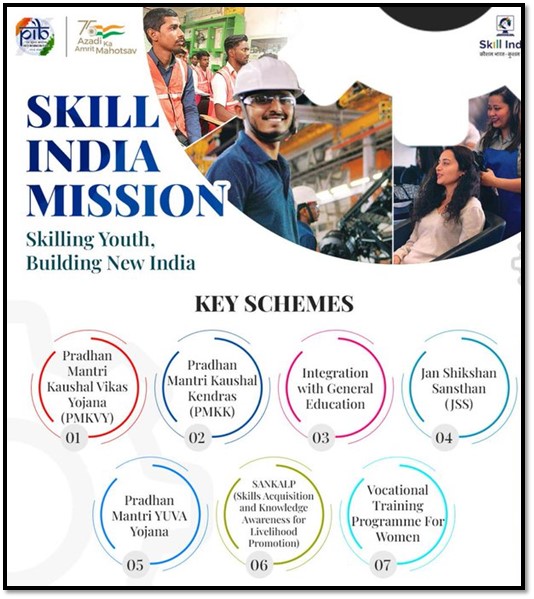Empowering India’s Workforce Through Skilling and Development Programs
India is paving the way towards becoming the Skill Capital of the world. With one of the youngest populations in the world, India can realise its demographic dividend through a workforce that is trained in ‘employable’ skills and is industry-ready. Significant progress has been made, with the employable percentage of final-year and pre-final-year students increased from 33.9% in 2014 to 51.3% in 2024. As India continues its journey towards becoming the skill capital of the world, various ambitious programs and policies are steering the nation towards a skilled, employable, and future-ready workforce.
Recent Initiatives

Prime Minister’s Internship Scheme 2024
One of the main initiatives aimed at skilling youth is the Prime Minister’s Internship Scheme. The Prime Minister’s Internship Scheme for 2024-25 aims to provide extensive internship opportunities to one crore youth over the next five years in India’s top 500 companies. Announced in the Budget 2024-25, this initiative offers 12-month internships to help young people gain hands-on experience in real-life business environments, bridging the gap between academic learning and industry needs.
A Pilot Project launched on 3rd Oct,2024 aims to 1.25 lakh internships for the Financial Year 2024-25, with top companies identified based on their CSR expenditure. The scheme operates independently from existing skill development programs and emphasizes enhancing employability through practical experience. The portal of the scheme will be opening for candidates on 12th Oct 2024.

Eligibility
The Prime Minister’s Internship Scheme offers a 12-month internship aimed at providing young individuals with real-world job experience. The key eligibility criteria include:
- Age: Applicants must be between 21 and 24 years old, Indian nationals, not employed full-time, and not engaged in full-time education. Those enrolled in online or distance learning programs are eligible to apply.
- Educational Qualifications: Candidates must have completed High School, Higher Secondary School, hold certificates from ITI, diplomas from Polytechnic Institutes, or hold undergraduate degrees such as BA, B.Sc., B.Com, BCA, BBA, or B.Pharma etc

The Prime Minister’s Internship Scheme offers comprehensive support and benefits under a Direct Benefit Transfer (DBT) model. Key highlights include:
1. Monthly Assistance: Interns receive ₹5,000 per month for 12 months. Of this, ₹500 is contributed by the company through its CSR funds, and ₹4,500 is transferred by the government to the intern’s Aadhaar-linked bank account.
2. Grant for Incidentals: A one-time grant for incidentals of 6,000 will be disbursed to each intern by the government through Direct Benefit Transfer, upon the intern’s joining at the internship location.
3. Training Costs: Expenditures associated with the training of interns under the Scheme, would be borne by the company from its CSR funds, as per the extant rules.
4. Insurance Coverage: Insurance coverage shall be provided to each individual intern under insurance schemes of the Government of India, Pradhan Mantri Jeevan Jyoti Bima Yojana and Pradhan Mantri Suraksha Bima Yojana, for which premium amount shall be provided by Government. In addition, the company may also provide additional accidental insurance coverage to the interns.
This initiative focuses on enhancing employability through direct industry exposure and practical job experience.
The Launch of Indian Institute of Skills (IIS)
Another cornerstone of India’s skill development efforts is the Indian Institute of Skills. The vision behind setting up IIS is to build world-class skill training centres by learning from and imbibing best practices from internationally renowned existing skill institutions.
An Indian Institute of Skills was inaugurated by Prime Minister Narendra Modi in Mumbai recently. IIS is designed to cultivate an industry-ready workforce for Industry 4.0, offering training in areas like factory automation, digital manufacturing, mechatronics, artificial intelligence (AI), data analytics, and additive manufacturing. These skills are essential for both the services and manufacturing sectors, as well as emerging industries such as electric vehicles (EVs) and robotics.

In addition to core programs, IIS offers short-term courses in collaboration with industry partners like Fanuc India for industrial robotics and Taj Skyline for culinary training. The combination of cutting-edge curriculum and strong industry ties positions IIS as a premier institution for skill development.
Other Recent Initiatives
Other Recent initiatives by the Ministry of Skill Development and Entrepreneurship (MSDE) include the ‘Swiggy Skills’ initiative in collaboration with Swiggy, aiming to provide skilling and employment for 2.4 lakh delivery partners. The STRIVE Project focuses on entrepreneurship and mentoring in ITIs and NSTIs. The PM-JANMAN initiative targets skilling and uplifting vulnerable tribal groups. Capacity building efforts include a programme for Fair Price Shop Owners, training 3000 participants in entrepreneurship. Under SANKALP, marginalized communities receive support for entrepreneurship. The Rashtriya Udyamita Vikas Pariyojana supports PM-SVANidhi beneficiaries with training and mentoring. Additionally, MSDE supports entrepreneurship development among jail inmates and organized the Bijnor Kaushal Mahotsav, creating jobs for local youth. Initiatives also focus on women empowerment, with training in aspirational districts, and a MoU has been signed with Visa to upskill 20,000 youth in tourism. Lastly, a Skill India Centre was established at Rashtrapati Bhawan for skilling in-house staff.
These recent initiatives by MSDE demonstrate a strong commitment to enhancing skill development and entrepreneurship across diverse sectors in India.
Other Key Initiatives
The Ministry of Skill Development and Entrepreneurship (MSDE) has spearheaded multiple initiatives under the Skill India Mission to enhance employability and skill development. Key programs include the Pradhan Mantri Kaushal Vikas Yojana (PMKVY), offering short-term skill training, and Pradhan Mantri Kaushal Kendras (PMKK), which standardize quality training across India. Other initiatives like Jan Shikshan Sansthan (JSS) target non-literate and rural populations, while the Pradhan Mantri YUVA Yojana promotes entrepreneurship. The launch of Skill India Digital (SID) introduces AI-driven tools for job matching and continuous learning. Additionally, the PM Vishwakarma Yojana supports traditional artisans by modernizing their skills and integrating them into global markets, ensuring sustainable livelihoods. Together, these initiatives are shaping a more skilled and employable workforce in India.

Conclusion
In conclusion, the Indian government’s initiatives have laid a strong foundation for enhancing skilling and employment opportunities. With continued focus on building a dynamic, inclusive, and future-ready ecosystem, India is well-positioned to harness the potential of its human capital, creating sustainable livelihoods and fuelling national development.

